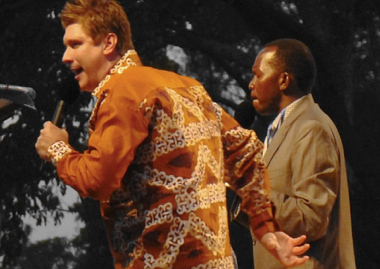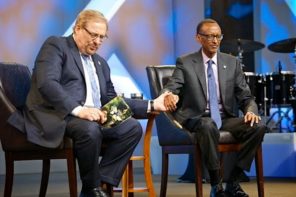“Each time you go to the doctor with a pain he will give you a different pill. With God there is only one pill, God’s pill, the ‘Gospill’.”
So intoned the Christ for All Nations (CfAN) evangelist, Daniel Kolenda, as he fired up the crowd for another evening of ostensible miracles and religious frenzy. For good measure, he added that God would put all students in the town at the top of the class, heal all cancers, cure HIV and AIDS, help all unmarried persons find a partner, and render all barren wombs fertile. A loud cheer erupted as Kolenda prophesied a population explosion in Gulu nine months hence—despite the fact that Uganda presently has one of the highest birth rates in the world.
At this point, several of our student group took to their heels in disgust.
The problem was that the town in question was Gulu in northern Uganda, the hub of the earth-scorching twenty-year long war, ended barely six years ago, between the Lord’s Resistance Army and the Government of Uganda. The majority of the crowd for the five-night Jubilee Crusade in late July was poor and desperate; victims, directly or indirectly, of one of Africa’s most brutal conflicts.
Tragically, one middle-aged woman with unknown medical complications even died on the spot, close to where we were standing, while being “exorcised” by local counselors. Several educated professionals we spoke to stayed away, critical of what one vicar termed the “false hopes” being delivered by this international crusade team.
CfAN claims to take the Gospel into some of the world’s most remote and dangerous places, and Gulu town does not fail in that regard. As Kolenda wrote in a blog post on Day One of the crusade: “Mass graves, child soldiers, mutilations, rape, murder, and genocide are words that come to mind when one thinks of this place.” There was a corresponding emphasis on delivering “demoniacs” and destroying ancestral curses, with a spectacular burning of witchcraft paraphernalia on the Saturday evening—just as in the missionary-inspired juju bonfires of an earlier colonial era.
Much was made of those “crippled by Kony, but healed by Jesus.” But why sing military-style gospel songs, hold imaginary rifles, and encourage marching and saluting for Jesus for a people devastated by war? Was the crusade theme of “Gulu and Fire” and all the talk of the blood of Jesus appropriate for a post-conflict region in its current phase of what local NGOs call an “uneasy peace”? And was it decent for Kolenda’s team to pass around donation bags in the poorest region of a country where 64% of the population lives on less than $2 US per day?
A Mission Ground Already Well Trampled
As with any mega-crusade, there had been a siege of advance publicity. Posters were plastered everywhere and, what with Africa being the radio continent, announcements were heard for days on the airwaves. Vehicles sporting PA systems toured the town blasting ear-splitting invitations to the crusade. Before long the cavalcade was roaring into town with a police escort. But, as the excitement grew, news started to filter out about a terrorist threat from the Somali group al-Shabab that was looking for “soft targets” in the north of Uganda—notably nightspots and large gatherings.
Our early inspection of the crusade ground on the first afternoon revealed a corps of volunteer crusade security guards, metal detectors, as well as an anti-terrorism brigade and a bomb squad. Yet a mere rope separated worshipers from would-be assailants. A Pentecostal friend or ours pooh-poohed all the security arrangements, saying that divine protection was what mattered.
By the third night, Africa’s most renowned and popular evangelist Reinhard Bonnke, billed prominently on the posters, had not appeared. A local organizer proffered the explanation of Bonnke’s age and his wanting to pass the mantle to his successor, Daniel Kolenda. A youth leader suggested to us that the security threat and the negative perception of the North were the real reasons behind his non-appearance. But the show carried on, with crowds swelling for the final weekend days (although nowhere near the numbers of 120,000 the organizers claimed for the Saturday evening—local press estimated no more than 10-12,000). Certainly one of the main attractions was the energetic local gospel music performed every night for hours before the preaching and healing began. Not only did it get us and our students dancing at the ground, but we could continue to enjoy its rousing sounds from our hotel balconies about half a mile away.
How starkly this contrasted with Kolenda’s hoarse, off-key rendition of “There is power in the blood of the Lamb” that had failed to elicit the desired audience participation earlier in the evening.
The public relations message of the organizers was that the crusade was meant to restore northern Uganda from its suffering at the hands of the Lord’s Resistance Army. “Gulu has just entered into a new season—one of salvation, blessing, and miracles,” declared Kolenda in his daily blog from the site.
Yet northern Uganda, as the rest of the country, is predominantly Christian (85%), with churches of all denominations full to overflowing. The first missionaries arrived in the region at the beginning of the twentieth century and, by the 1940s, local converts were serving as key agents in the East African Revival movement. So was the implication that they had been ineffective?
This was awfully reminiscent of the message of another set of “white saviors”—the Invisible Children team—whose inaccurate and misleading viral video, KONY 2012, failed to credit the extensive work of Ugandan civil society organizations in rebuilding their society after the war.
The crusade ended just as dramatically as it began, but with the threat shifted from terrorists to thunderstorms. Uganda is the lightning capital of the world, with frequent stories of tragic deaths, so we felt sure that the looming dark clouds and dramatic lightning strikes visible on the horizon from the fourth floor of our hotel would impel the organizers to disperse the vulnerable crowds without delay.
After what seemed like an interminable wait, the strains of music and passionate preaching ceased and people streamed back to their homes in the tropical downpour. Gulu had provided the opportunity for a final show of power, allowing Kolenda to declare: “Even though the storm was raging all around us, He protected our crusade ground from the deluge.”
Would that he could return in nine months to verify whether God’s Pill produced all those babies and jobs—or whether an impoverished northern Uganda remained marginalized, underfunded, and underserved.




